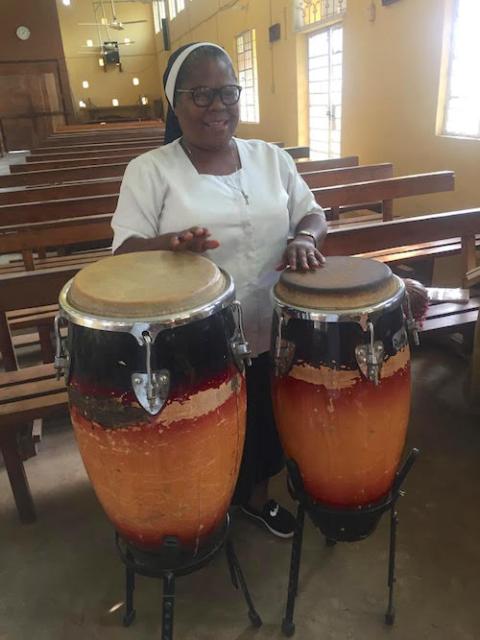
Sr. Clara Azubuike conducts a choir of Sisters of St. Louis in Nigeria. (Provided photo)
My life has always been immersed in music. I started singing at age 7 in a mixed choir of children and adults in my village church of St. Mary's, in Ugbelle, Imo state, Nigeria. We learned many songs, both church and traditional Nigerian, and participated in parish choral competitions in the nearby city of Orlu. Yes, my family was a singing family. My father was a member of the church choir, and so were two of my siblings. They were very supportive of my talent and desire to do more in music.
When I became a postulant of the Sisters of St. Louis in 1990, I was still excited about music and confident I could do more. I had met two sisters before my entrance who seemed to love music as much as I did. One was Sr. Patricia Ojo, whom I met in Lagos soon after I moved there to live with my uncle. She heard me chant the responsorial psalm at Sunday Mass that day and afterward congratulated me for my singing. Her words gave me joy as I returned home. The other person was Sr. Mary Okewola, also a good singer. She came to our church in Lagos to give a vocation talk and brought with her a display of pictures of sisters in their various activities. Looking through them, I saw sisters playing different musical instruments: guitar, keyboard, mouth organ, local drums and many more. These pictures of young sisters gave me encouragement that I could develop my talent as a sister too.
Advertisement
To my surprise, Sister Patricia was my novice mistress. She is very musically talented and so was our music teacher, Sr. Carmel Dodd. They helped us develop our music skills, teaching us new songs and — for some — how to play a variety of musical instruments. I started learning to play the keyboard but did not perfect it. I was good at playing the shekere, a dried gourd with beads woven into a net covering the gourd, and local drums. The shekere and the musical pot caught the interest of most of the novices, and we used them a lot to accompany our hymns and songs. Some of the sisters already had learned to play these at home.
As I matured in religious life, I composed some songs. One of which is "Sint Unum" (To be one). It is a motto from the founders of our congregation. Whenever we sing it, we are reminded of our heritage. Others are "The Great Jubilee," composed in the year 2000, and "Don't Be Shy in Telling Your Story; In Whatever You Do, Tell a Story," written in 2017 when we told our congregation's story within the context of the scriptural story of creation.
Later, we expanded this to telling the stories of what we do in our various apostolates. It was our way of communicating our ministry and life to sisters of other regions of the institute.

Sr. Clara Azubuike plays the two-in-one drums. (Provided photo)
Music has always been important in the Nigeria Province of the Sisters of St. Louis. In 2015, when our strategic plan was being formulated, the provincial leadership team saw a need to include music in the strategic plan. I was appointed a member of the newly formed committee on music, whose role was to build up and improve music in the province. The leadership team encourages sisters interested in studying music to do so. This is exciting news to me because right now none of our sisters is professionally trained in music.
I am currently the chairperson of the provincial music committee. This is a big challenge for me as the committee continues to seek ways to motivate sisters to work at improving our music in the province. There are many sisters who sing well but need to be organized into a choir to lead music at our provincial celebrations. Currently, there are a few who volunteer to sing during these celebrations and come a day early to practice. Others might show up on the day and help out, but it is not a good system. Playing local drums is a talent a number of our sisters have, and they usually accompany our singing. Two sisters play the gangan, the talking drum. Its pitch can be regulated to mimic the tone of human speech. It has two drumheads connected by leather tension cords, which allow the player to change the pitch of the drum by squeezing the cords between their arm and body. Finally, a few sisters play the piano but we have yet to find someone to play it professionally.
The postulants and novices join the singing during the celebrations, but they do not necessarily read music. They learn the songs by rote, and a few play some of the musical instruments. Apart from the need to develop the sisters' talents, logistics is a major factor in our dream of forming a provincial choir. Our sisters are scattered throughout Nigeria, which is a huge country, and we always have to consider distances between communities when bringing sisters together for rehearsals. We need to do more in organizing ourselves into a more formidable choir, and for this we need motivation and encouragement from our leadership team to help us move forward.

Sister Lucy conducts the singers at the final profession ceremony for the Sisters of St. Louis. (Provided photo)
Even though we lack sisters with professional music skills as teachers, music is part of our schools' daily schedules. Some of our lay teachers are skilled at the keyboard; at our school in Ondo, one of them even takes time to teach this skill to her students 7 years or older. Children need singing and dancing, not only for fun, but also managing stress and for learning lessons. This is particularly true in the lower grades. Teachers find that children can learn things faster through singing and dancing out stories and new ideas. Children even become teachers of their parents when they take their songs home.
A number of teachers in our schools do have children participate in choral singing, especially at Christmas time. I have had the chance to hear these caroling groups and find they do very well. Of course, their parents and friends enjoy these performances very much. Good singing is a skill and it is not easy to teach children, particularly to learn rhythm. They usually just sing their hearts out with gusto without much discipline and attention to rhythm. Music is a wonderful way to learn discipline and build confidence.
As a lover of music, I have two dreams.One is that since our traditional story will not be complete without music as part of its daily life, we will make professional music a new priority. Then, we could return to our traditional hymns and make a new CD (our last one was in 2000). We have a lot of potential in our province. My second dream is that all of our schools will do more to make sure music is an essential part of the daily schedule.

Sisters of St. Louis sing in choir at the final profession of Sisters Lucia, Mary and Roseline. (Provided photo)
[Sr. Clara Azubuike is a Sister of St. Louis from Lagos, Nigeria. She began her ministry teaching 3- to 7-year old children in the nursery classes before obtaining her Nigerian certificate in education, an undergraduate degree in the arts and a master's degree in early childhood education. She taught religion in two secondary schools, where she became involved the parish choir. Later she served as head eeacher in another school, and is currently the principal of St. Louis Nursery and Primary School, Ondo.]








